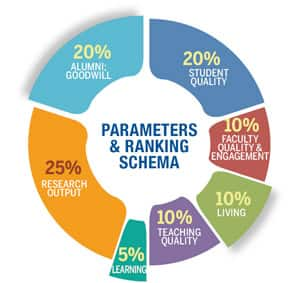Manav Rachna University Law Admissions 2026
Admissions open for B.A. LL.B. (Hons.), B.B.A. LL.B. (Hons.) and LL.B Program (3 Years) | School of Law, MRU ranked No. 1 in Law Schools of Excellence in India by GHRDC (2023)
Careers360 has ranked law colleges of India based on Ranking Methodology, which includes Input, Process and Output. Read below Careers360 Law Colleges Ranking Methodology and also get ranking of top public and private law colleges of India
The need of Ranking Law Colleges – The country has close to 1300 law institutes and the Bar Council of India (BCI) still expresses its limitation of having exceptionally limited resources to assess their performance including lack of members for inspecting the new and existing law schools. The BCI on the basis of an inspection report and recommendation of the Legal Education Committee granted approval of affiliation to 92 new colleges in 2014. The Council also granted extension of affiliation to 223 existing colleges during the same period, as per the Annual Report of the Ministry of Law and Justice (2014-15). Careers360 Ranking is an attempt to assess the best law institutes among them on the basis of objective parameters that matter the most to students and helps the institutes to know where they stand among their peers.

The Process - The first step was to create a list of all the institutes that impart law programme(s) at the undergraduate level such as 5-year integrated B.A. / BBA / B.Com / B.Sc with LLB and also 3-year LLB. A short list was then made of those institutes that were (1) preferred by students in the respective region/state assessed through cut-off scores (wherever available), and popularity on Careers360 portal and (2) figured in ranking/rating of top Law Schools conducted by reputed magazines/agencies in the last three years. This exercise gave us 108 such institutes. We also included those that participated in the Careers360 ranking survey advertised in November 2015.
The second step involved a comprehensive exercise of populating the rank sheet with critical details like student enrolment, diversity, faculty, educational qualification, infrastructure, residential facility, average salary of the recent passing out batch, research output and so on. Data was sought directly from institutes and also accessed from the official websites, Annual Reports and through RTI applications (for public institutions). The total institutes thus available for preliminary evaluation after filtering those that did not have adequate data (on different parameters as given in the Table) was 82. The next step involved screening of institutes that had no publications in any of the 430-odd journals (law-related) out of over 20,500 reputed journals indexed in Elsevier’s Scopus database over a period of 5 years. The research output score was arrived at by looking at the publication count (2011-2015), citation per paper, productivity and h-index.
Admissions open for B.A. LL.B. (Hons.), B.B.A. LL.B. (Hons.) and LL.B Program (3 Years) | School of Law, MRU ranked No. 1 in Law Schools of Excellence in India by GHRDC (2023)
North India's Largest Educational Group | NIRF Ranked 87 | NAAC A+ Grade | Highest Package 1.6 Cr
We thus list out Careers360’s 2016 edition of Indian Law School Ranking comprising 40 Law Schools (10 more than last year) which includes 30 in Public and 10 in the Private domain.
Ranking Schema 2016 - Careers360 Ranking of Law Colleges comprises three basic parameters - Input, Process and Output. While, Input includes different factors - Student Quality and Faculty Quality, Process includes two factors - Living and Learning whereas Output was based on Accessibility, Research Ouput and Alumni Goodwill.
Parameters and Weightages / Ranking Schema (2016) | |||
Methodology | Parameters | Score | Inclusions |
INPUT | Student | 100 | Diversity (gender, region); Entrance test score/ |
Faculty Quality | 75 | PhD faculty, teaching & legal domain experience | |
PROCESS | Living | 50 | Residential campus; |
Learning | 75 | Recognition; Student-Faculty ratio; Key Activities viz Moot court and other competitions, Clinics | |
OUTPUT | Accessibility | 25 | Fee & Financing |
Research Output | 100 | Publication count scaled against authors; citation H-index et al | |
Alumni; Goodwill | 75 | Perception; Alumni status; industry/society interface | |
We thus list out Careers360’s Law School Ranking comprising 52 Law Schools, which includes 30 in public and 10 in the private domain.
Among top 100 Universities Globally in the Times Higher Education (THE) Interdisciplinary Science Rankings 2026
NAAC A++ Accredited | Ranked #11 by NIRF
Excellent curriculum; an impressive range of electives, besides core law courses. Up to 100% merit scholarship on a first-come, first-served basis
NAAC A+ Accredited | Among top 2% Universities Globally (QS World University Rankings 2026)
Last Date to Apply: 25th Feb | Ranked #18 amongst Institutions in India by NIRF | Ranked #1 in India for Academic Reputation by QS Rankings | 16 LPA Highest CTC
#14 in India by NIRF Ranking | NAAC A++ accredited | Approved by BCI | Scholarships Available